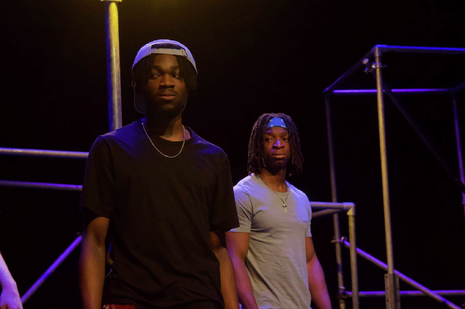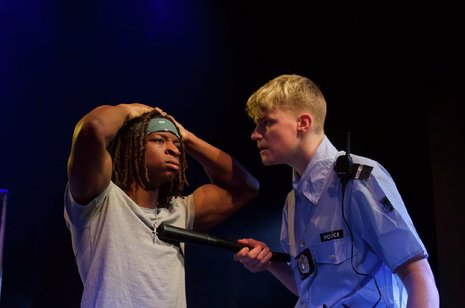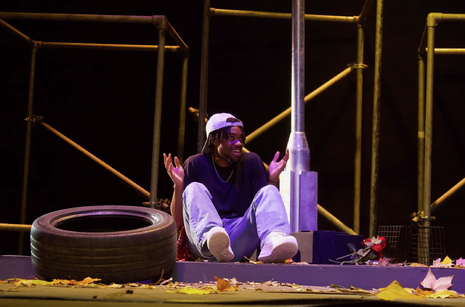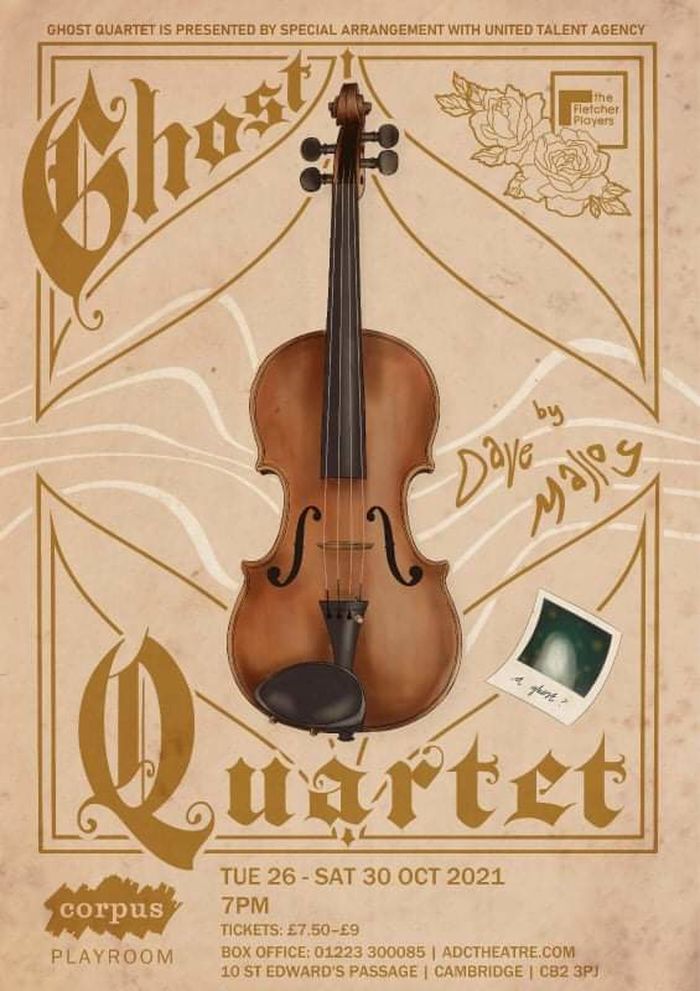Pass Over review – a searing, biblical masterpiece
Theatre Editor Fergal Jeffreys reviews Pass Over at the ADC, Antoinette Nwandu’s haunting portrait of the American racial divide

A ghetto street. A lamppost. Night but also a plantation but also Egypt, a city built by slaves.
This vignette is all Antoinette Nwandu provides for the setting of her 2017 play Pass Over; in these two sentences one can find the plays influences. Drawing on Waiting for Godot and the Book of Exodus, Nwandu’s script sees two young black men standing around, bantering on an American city corner. Moses and Kitch dream of ‘passing over’, entering a promised land free from the dread of police violence that always seems so close by. A play of two symmetrical halves, the young men are caught in a cycle of dread from which they seemingly can’t escape.
"This is a difficult script for any actor and Olatunji and Eradiri deftly lift it off the page"
Nwandu wrote Pass Over in response to the shooting of Trayvon Martin in 2012 – an incidence of racist murder that has tragically remained resonant in 2021. Yet the story of two black men caught in a cycle of dread transcends 21st century America. The motifs of a corrupted American dream are there in the accents, food and clothes. One of the four main characters for instance dresses and sounds like a white plantation owner. But these identifiers are worn superficially and as the opening description implies, this story is centuries older: the connection between being black and facing violence. Performing Pass Over in Cambridge finds further layers of meaning with two opening poems referencing the experience of being black in Britain. Racist policing haunts Moses and Kitch – they’ve lost family and friends – and its arbitrariness threatens to one day take them. If the influence of Waiting for Godot is the cycle, the influence of the Book of Exodus is when this cycle buckles.

This masterful production – directed by Adédàmọ́lá Láoyè – is a close study of the original script, teasing out the richness of an essentially simple story. Nwandu’s dialogue is sharp, musical patois and all three actors skilfully weigh every word and beat. Michael Olatunji and Ditie Eradiri who play Moses and Kitch respectively, are brilliant. Both examine the complexity of their characters beyond the dialogue, through movement, poise, and inflection. Moses, the leader of the two, is torn between a natural cynicism and a profound yearning to escape. The tension between Moses’s suspicion and Kitch’s optimism breathes first humour and then dread into two fateful encounters. Nwandu often has one, or two word lines to facilitate a subtlety of expression. This is a difficult script for any actor and Olatunji and Eradiri deftly lift it off the page.
'This is an excellent production – full of dread and darkness"
Completing the accomplished trio is Joe Harrington – the third and final cast member. Harrington carefully pulls at the darker threads of the white suited interloper Mister, whose apparent innocence and self-restraint belies a darker cruelty. His tight, high-pitched laugh becomes both an instrument to disarm and conceal. A case could be made that the characters of Pass Over are essentially caricatures – not least the racist officer, also played by Harrington – acting out a biblical confrontation. That these three actors can balance the prototypes of their character without losing the contemporary vision is a testament to their individual sureness.

Language is both a vehicle and object of familiarity and violence in Pass Over. Moses and Kitch’s explicitness and frequent use of the n – word upsets Mister who speaks with a regulated, even reticent vocabulary. The Mister’s world of controlled language is one also occupied by the officer whose expectations of deference Moses and Kitch are violently forced to yield to. That Moses and Kitch can only express themselves in each other’s company further develops the pervasive fear of the play – for these young men an innocuous word out of place can bring violence.
This is an excellent production – full of dread and darkness. The use of sound and light builds tension from the off without being too heavy handed. The choreography is sharp too – Moses and Kitch range across the space, orbiting each other, moving in and out of the periphery based on the meanders of their conversation. Great direction foregrounds the actors while enriching the atmosphere, director Adédàmọ́lá Láoyè has achieved this beautifully.
Bringing Pass Over to Cambridge with its predominantly white audiences is a bold, brilliant choice. Indeed, Láoyè’s direction challenges such an audience in their interaction with these themes. Is this audience meant to laugh at the banter between Moses and Kitch, streaked as it is with allusions to racial stereotypes and language? Is the audience meant to feel trapped, as Moses and Kitch do in this cycle of fear and violence, is that the purpose – if a play can even have a purpose – of Nwandu’s script? Mister’s final monologue too, a stumbling evocation of white guilt is directed straight to audience as he perches on stage. The question of the audience is ultimately left undefined.
This is special theatre – perfect direction meets a perfect cast. You simply have to see it.
Pass Over is running from Tuesday 26th until Saturday 30th October at the ADC Theatre.
 News / Downing investigates ‘mysterious’ underground burial vault 29 December 2025
News / Downing investigates ‘mysterious’ underground burial vault 29 December 2025 News / Unions protest handling of redundancies at Epidemiology Unit30 December 2025
News / Unions protest handling of redundancies at Epidemiology Unit30 December 2025 Lifestyle / Ask Auntie Alice29 December 2025
Lifestyle / Ask Auntie Alice29 December 2025 Features / ‘Treated like we’re incompetent’: ents officers on college micromanagement30 December 2025
Features / ‘Treated like we’re incompetent’: ents officers on college micromanagement30 December 2025 Science / Astronomical events to look out for over the break29 December 2025
Science / Astronomical events to look out for over the break29 December 2025











